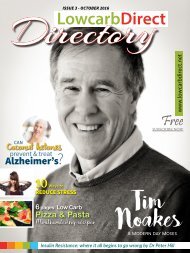Magazine
Create successful ePaper yourself
Turn your PDF publications into a flip-book with our unique Google optimized e-Paper software.
12 | LowcarbDirect Directory - Issue 1 - August 2016<br />
The Metabolic<br />
Syndrome<br />
By Dr Peter Hill from UpforIt<br />
It is estimated that one in every four South Africans<br />
suffers from Metabolic Syndrome. In this introductory<br />
article, I briefly explore this growing pandemic: what<br />
it is; something on the causes and prevalence; how<br />
to identify it and a bit on the resources available to<br />
manage this condition more effectively.<br />
What is Metabolic Syndrome?<br />
Metabolic Syndrome has become an increasingly common condition<br />
around the world. It is often found to be present in families and the risk<br />
of developing it increases with age. People with Metabolic Syndrome<br />
tend to be overweight. It is considered to be a major risk factor for cardiovascular<br />
diseases and type 2 -diabetes. Research also indicates that<br />
Metabolic Syndrome substantially ups the risk of developing certain cancers,<br />
liver disease and Alzheimer’s disease.<br />
The syndrome is not a disease in itself, but rather a cluster of disorders<br />
related to a particular type of metabolic dysfunction known as insulin<br />
resistance. Other associated disorders include high blood pressure, high<br />
blood sugar, low ‘good’ cholesterol levels, elevated levels of triglycerides<br />
(or blood fat) and excessive abdominal fat. One would have to have at<br />
least three of these disorders to be officially diagnosed with Metabolic<br />
Syndrome.<br />
Causes of the Condition<br />
In addition to insulin resistance,which appears to be the main cause,<br />
obesity, unhealthy lifestyle choices, hormonal imbalances, as well as genetics,<br />
all influence the development of the syndrome. In people with insulin<br />
resistance, insulin (the hormone that helps the body utilise glucose<br />
as energy) doesn't work efficiently. The body thus secretes more insulin<br />
than it should in an attempt to cope with the rising level of blood sugar<br />
(glucose) and this, in turn, can lead to a person developing diabetes, as<br />
well as the other conditions associated with Metabolic Syndrome.<br />
Insulin resistance is particularly associated with excessive tummy<br />
fat and thus substantially increases the risk of developing Metabolic<br />
Syndrome. About 80% of obese adults are likely to have Metabolic<br />
Syndrome and approximately 40% of normal weight adults may also<br />
have, or be at risk, for Metabolic Syndrome.<br />
A healthy body mass index (BMI), as defined by the World Health<br />
Dr Hill<br />
UpForIt (Pty) Ltd<br />
Biography<br />
Dr Peter Hill is a founding partner<br />
and the Chief Scientific Officer (CSO)<br />
of UpForIt (Pty) Ltd. He earned a<br />
doctorate in patient behaviour in<br />
Type 2 diabetes mellitus at Rhodes<br />
University in South Africa, where he<br />
was subsequently appointed to the<br />
position of Visiting Fellow.<br />
Part of his doctoral studies included<br />
undergoing training in chronic<br />
disease self-care at the Patient<br />
Education Centre at the medical<br />
school at Stanford University in the<br />
USA. His post-doctoral studies focused<br />
on the role of nutrition in the<br />
Metabolic Syndrome, with special<br />
emphasis on self-care, and in 2014<br />
Dr Hill was elected a Member of the<br />
American College of Nutrition.<br />
Today much of his research and<br />
practice remains focused on helping<br />
people with Metabolic Syndrome<br />
improve their self-care capabilities<br />
as very few people with, or at risk of<br />
developing the syndrome, are adequately<br />
empowered, i.e. trained,<br />
taught and encouraged, to change<br />
key health-related behaviours.<br />
health






